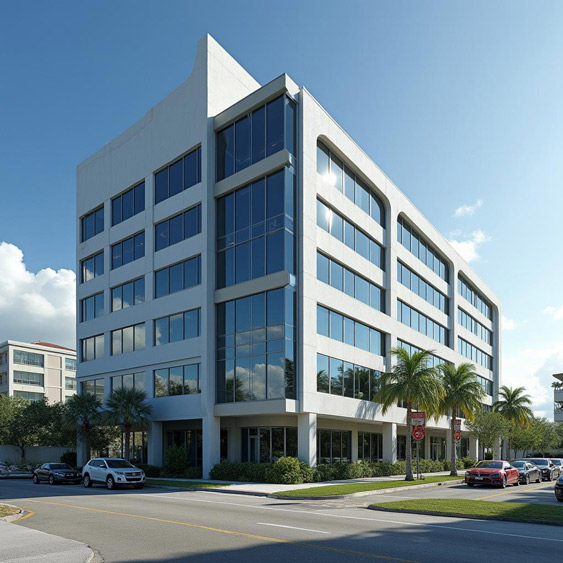Considerations for Investing in Office Buildings in Pensacola, Florida
Are you considering making an investment in office buildings located in Pensacola, Florida?
This decision could be a significant step towards diversifying your investment portfolio and capitalizing on the growth potential of the area. Pensacola, with its unique blend of historical significance, scenic beauty, and economic development, presents a compelling case for real estate investors.

Office buildings are a significant segment of the commercial real estate market, designed primarily for the purpose of housing businesses and professional services.
These structures can vary widely in size, design, and function, ranging from small, single-story buildings that accommodate local businesses to towering skyscrapers that serve as headquarters for large corporations.
Office buildings are typically classified into several categories, including Class A, Class B, and Class C, based on their location, quality, and amenities.
Class A office buildings are often located in prime areas, featuring modern architecture, high-quality construction, and premium amenities. They attract high-profile tenants and generally command higher rental rates.
Class B buildings, while still functional and well-maintained, may not have the same level of prestige or location benefits as Class A properties.
Class C buildings are usually older, may require significant renovations, and are often situated in less desirable areas. Investors in office buildings should consider various factors that can significantly impact the performance and value of the property.
Key Considerations for Investors Before Buying an Office Building
- Location
The location of an office building is one of the most critical factors influencing its success in Pensacola, Florida.
Proximity to transportation hubs, amenities, and a skilled labor pool can attract desirable tenants. Investors should assess the surrounding area’s economic health, growth potential, and accessibility to ensure long-term viability.
- Market Trends
Understanding current market trends in the office space sector is essential. This includes analyzing vacancy rates, rental rates, and demand for office space in the area. Investors should stay informed about shifts in work culture, such as the rise of remote work, which can affect demand for traditional office spaces.
- Building Condition and Maintenance
The physical state of the building plays a crucial role in its investment potential. Investors should conduct thorough inspections to identify any necessary repairs or upgrades that could impact operational costs. A well-maintained building not only attracts tenants but also preserves its value over time.
- Tenant Mix and Lease Structure
The composition of tenants within the building can influence its stability and cash flow. A diverse mix of tenants can mitigate risks associated with vacancy. Additionally, understanding lease structures, including lease lengths and terms, is vital. Long-term leases may provide steadier income, while shorter leases might require more frequent tenant turnover.
- Financial Analysis
Are you considering making an investment in office buildings located in Pensacola, Florida? This decision could be a significant step towards diversifying your investment portfolio and capitalizing on the growth potential of the area. Pensacola, with its unique blend of historical significance, scenic beauty, and economic development, presents a compelling case for real estate investors.
Investors must perform comprehensive financial analyses, including evaluating the property’s income potential, operating expenses, and financing options. Understanding the return on investment (ROI) and cash flow projections is essential for making informed decisions.
- Regulatory Environment
Familiarity with local zoning laws, building codes, and regulations is crucial. Investors should be aware of any restrictions that may affect the property’s use or future development potential. Compliance with regulations can also impact operational costs and tenant satisfaction.
- Future Development Potential
Analyzing the potential for future development or expansion can provide insight into the long-term value of the property. Investors should consider the possibility of renovations, upgrades, or even changes in zoning that could enhance the property’s appeal and profitability.
- Economic Factors
Broader economic conditions, such as interest rates, employment rates, and overall economic growth, can significantly impact the office real estate market. Investors should keep an eye on economic indicators that could affect tenant demand and rental income.